The Checker Maven
The World's Most Widely Read Checkers and Draughts Publication
Bob Newell, Editor-in-Chief
Published every Saturday morning in Honolulu, Hawai`i
Noticing missing images? An explanation is here.
Support the US vs Italy Team Match

Checker history is about to be made starting April 20, 2018, when an all-star team of American players travels to Rome, Italy to face top Italian players. While US vs. Great Britain matches have taken place numerous times over the last century, with the US largely dominating, this US-Italy match-up is a first, and the Italians are very strong indeed.
The US team faces significant costs, and you can help by following this link to the American Checker Federation on-line store, and donating whatever you wish.
Of course, The Checker Maven is US-based, so we're behind our US team, but we wish the best of luck to all in what we're sure will be a spectacular event.![]()
Diagram Display Quirks

Some of our board diagrams, notably those published between 2005 and 2011, have started to display incorrectly on the Chrome browser as of Chrome version 64. There are no problems with Chrome version 63 or earlier, and we don't yet know why only some diagrams are affected.
There's little we can do about this, and we can only hope that Google fixes their browser as soon as possible.
If you run into this issue, we suggest using a different browser (such as Firefox). Please accept our apologies for this inconvenience, which is outside our control.
Update as of March 8, 2018: We reported the problem to Google and it's fixed in Chrome 65. ![]()
Nine Hours And A Headache
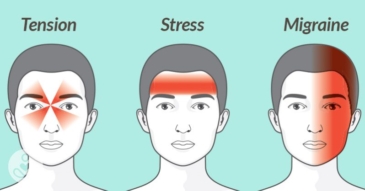
The Checker Maven site was down for more than nine hours yesterday (Saturday, January 21, 2018), in what was probably the longest outage in our more than thirteen years of publication. Of course, it would have to take place on a Saturday, which is our weekly publication day, and when offices are closed and tech support staff are few and far between.
After 70 minutes on the phone with hosting provider GoDaddy, we were told that the server had gone down (we knew that) and it could take as long as three days to move us to a new server. Fortunately, that got done in about six more hours, and then we were up again.
Well, not quite. The new shared hosting server had some configuration differences, and we were here in the office well into Saturday evening getting things squared away. Doing this kind of work "au pied levé" isn't anyone's idea of fun, but we have to do what we have to do.
Fortunately, all is well once again, and our headache is receding. Our apologies for the inconvenience and our thanks for staying with us.![]()
Increased Hosting Costs for Checker Maven

When we launched The Checker Maven years back, web hosting costs were a lot lower. But with the passage of time, costs have risen and now our web hosting alone runs well above $200 a year, and we haven't even begun to tally other costs, nor do we wish to.
The Checker Maven is free, and free from outside advertising, and always will be. We will never charge for our content and we will never accept advertising from anyone. Period.
However, we will advertise our books, as print versions do generate a small profit. And we are considering a change in our policy on accepting donations. Right now we won't accept them even if offered, but at some point we might.
Thank you for being a reader of The Checker Maven and for your understanding.
Checker Cruncher
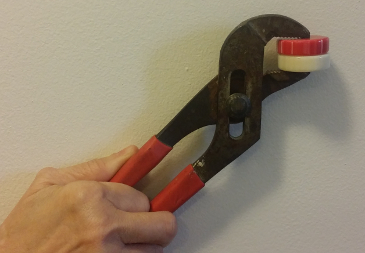
Checker Cruncher is a new website under development by Brooks Thomas, and it's the first online checker tactics trainer to make an appearance.
While there's still some work to do, the site is eminently usable right now, and we found it rather impressive. We've made many repeat visits. A subscription model is contemplated for the future, but at the moment the site is completely free.
We asked Mr. Thomas to answer a few questions for us, and he graciously took the time to provide detailed responses.

1. So what's Checker Cruncher (CC) and what can we expect to find there?
Checker Cruncher is a web application designed to help people improve all aspects of their game and have fun doing it. The heart of the site is a large number of automatically generated tactics puzzles. Both players and puzzles get Elo ratings so beginners will be given easier problems while experts will be given more severe challenges. Other learning tools are also available such as a searchable database of expert games and an opening explorer to look at win rates and best moves. The puzzles are better for tactics and end games while the database is more for openings and strategy. Lastly, there is a forum for giving feedback and asking questions. More is coming as it's built.
All the puzzles come from real games where one player had the opportunity to win. Maybe that player found it and maybe they didn't but the engine claims the opportunity was there. Your task is to exploit said opportunity to the fullest. Some puzzles are as simple as promoting a king or choosing the better capture. Others are 20+ moves deep with zero margin for error. Each is a bite sized piece of practice for both the speed and accuracy of your calculation which is critical to avoid blunders and pounce on your opponent's mistakes. After each attempt you can check out the game the puzzle came from or look to the computer analysis for the answer. As of September, 2016, the puzzles are selected randomly because the ratings have not yet stabilized. As the player and puzzle count grows and the puzzles get sorted by difficulty I'll implement the smarter problem selection.

2. What gave you the idea for CC?
I got the idea for Checker Cruncher from a friend at the coworking space where I work. I was playing a game of checkers over lunch and lamenting the lack of a checkers version of ChessTempo when he asked, "Why don't you build it?" At the time I was making a mobile app about billiards that I didn't have much faith in. Over the next few days it become obvious to me that Checker Cruncher was going to be both more fun to build and more likely to succeed. I knew I was on to something when I started getting distracted from building the site by practicing checkers on the site. Since then I've had more ideas then time to implement them.

3. How long have you been working on it?
I started work almost exactly two years ago. I had never built a website before so HTML, CSS, and Javascript were almost entirely new to me. I actually started by doing Michael Hartl's tutorial for Ruby on Rails. Like many projects; if I knew then what I know now it would be long done. I've come a long way since then, both in programing and checkers abilities.

4. How do you see the site developing in the future?
I've got a huge list of features I want to add, I don't think I'll ever run out of ideas. I'd like to see a smarter problem generator, a larger game database, puzzle comments, tags, and share buttons, leaders boards, achievements, end game tutorials, live play, etc. I'm only one person so none of these are coming soon but if the site gets traction and enough users to pay for the hosting costs I'll keep adding features. Who knows where it might go?
In the near term I'm working on improving the site experience on mobile devices. It's not quite ready for phones but it's close. The smarter problem generator is also a big priority. I'd like the next batch of puzzles to be more consistent with where they start and end. It should also create fewer puzzles that have many winning moves. In the mean time, if you bump into a puzzle you don't like point it out on the forums. I can disable it and add it in my test cases.

Checker Cruncher creator Brooks Thomas
5. Tell us a little about yourself (age, background, education, interest in checkers, location, profession, whatever you wish).
I'm 31 years old, living in Philadelphia. I got my degree in Computer Science at the University of Rochester in NY and have been a professional programmer since. Most of my experience is in windows desktop applications. Outside of work I've always had an interest in games and game theory. A little before I started Checker Cruncher I started playing chess more seriously and I'm now a 1700 rated player which I'm quite proud of. When I get the chance I also enjoy hiking and mountain climbing with my lovely wife Amanda.
I had no idea checkers was even an interesting game until reading about Chinook in One Jump Ahead. That was probably five years ago. I downloaded Martin Fierz's CheckerBoard and of course the engine Cake stomped on me so badly I didn't understand why. But I loved the simplicity of the rules vs the monstrous difficulty of the play. So I bought some pieces and started playing with whoever was willing. Now I play primarily with my friends and against my phone. I've thought about playing online but haven't really broken into it yet.

6. Do you think CC will become a major resource for checker training? Is that your long-term goal or hope?
Yes I hope so. I know it already works great for beginners. A few friends and I have been testing it and we've improved dramatically. Even very strong chess players have to practice tactics regularly, I think checkers must be similar. If it gets a healthy user base and good feedback I think Checker Cruncher could be a tremendous tool.
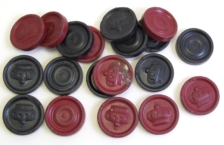
7. What do you see as the future of English checkers? Is it bright or not so bright? Do you think checkers might some day see a revival?
Lots of work needs to be done of course but I think the future of checkers is very promising. One of the major reasons I play chess and checkers instead of Counter Strike and League of Legends is accessibility. Checkers has been around for centuries, it's one of only a handful of games you can play with both your grandparents and your grand kids. It's not going anywhere. Moreover I think more people are playing checkers now than ever before. The checkers phone apps have millions of downloads. People may be playing casually, primarily against their phones, or even without forced capture. But they play and if more serious players and organizations can reach and educate them I see no reason why checkers can't be a large and thriving community.

8. Any advice for the aspiring checkerist and/or user of your site?
For the aspiring checkerist:
Play! Play with whoever is interested, kids, parents, coworkers. Checkers is the perfect game over a lunch break. But do warn your opponents about forced capture; at least where I am very few people know about that rule.
If you're playing against your phone or another computer turn the difficulty up to where you win or draw a little more than half the time. You should win often enough that you don't get frustrated but lose often enough to learn to be careful. As you improve, turn the difficulty up again.
For the tactics problems:
Like when you're playing over the board don't try to guess the answer. Take your time, spend five minutes thinking and try to see the whole solution before you make the first move.
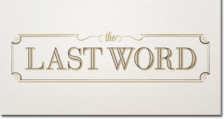
9. Anything else you wish to say or add?
Please participate in the forums, feedback of all kinds is deeply appreciated! This is especially true for intermediate and advanced players, I'm working from my chess experience about what works, but checkers is a different game. For instance I'd love help building a list of favorite puzzles. My favorite so far is number 127.
BLACK
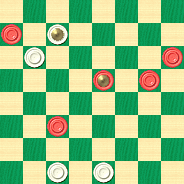
WHITE
White to Play and Win
W:W31,30,9,K6:B22,16,K15,12,5.
This is definitely an entertaining problem, and it isn't all that hard if you find the correct first move. Give it a try, and then either go to the Checker Cruncher website to see this problem and thousands more, or click on Read More to verify your solution.![]()
Publication Times
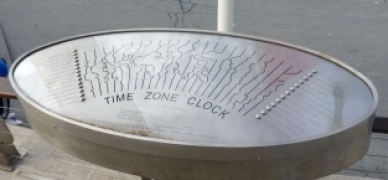
The Checker Maven originally appeared each Saturday at 2:02 AM MST (GMT-7). When our offices relocated from Santa Fe, NM, to Honolulu, HI, our publication time changed to 2:02 AM HST (GMT-10).
Now, many of our readers are on the east coast of the United States and look for the latest column early in the morning. With our present publication time, the week's offering isn't available until 8:02 AM EDT. That's later than we might like, and so effective at once we'll be moving to a publication time of 00:02 AM HST, or two hours earlier than the current publication time.
We hope this time change makes access to The Checker Maven a little more convenient for our readers.![]()
April Fool Recap
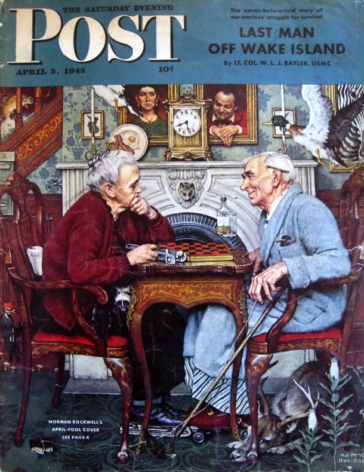
This column will appear on April 2, 2016. Yesterday was April 1, or "April Fool's Day," the traditional date for all sorts of stunts and jokes.
On April 1, 1943, the above Norman Rockwell drawing appeared on the cover of The Saturday Evening Post.
Mr. Rockwell did a certain amount of checker art, but in this particular instance, he deliberately riddled the drawing with errors, 43 of them by his count. (How many of them can you find? A larger version of the drawing can be found here.)
Today's problem is more in the nature of a "thought" problem. We know it's possible to construct positions that can't arise on the checkerboard. Here's one taken from "Impossible Settings" in Ben Boland's book, Famous Positions in the Game of Checkers.
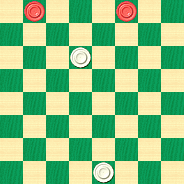
WHITE
White to Play
W:W10,31:B1,3.
There are only four pieces in this position, but we'd like to challenge you to find the minimal position that can't possibly arise in play that follows the rules. Can you find an impossible setting with fewer than four pieces?
The picture at the top of this article may give you a clue as to the answer. Click on Read More when you're done fooling with this and wish to see the answer.![]()
Office Renovations
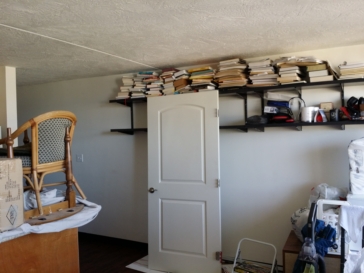
The Checker Maven is in the midst of office renovations, and it's a stressful, difficult, and expensive time. We'll be shutting down our computers tonight (Monday, February 8, 2016) around 8 PM HST, and they'll be off for a couple of weeks. Never fear, The Checker Maven website will stay online and Saturday columns will appear on schedule. It's just that we might be a little slow in responding to email, as for the most part we'll be working out of the Hamilton Library on the University of Hawai`i Mānoa campus.

We'll be back as soon as we can!
![]()
JR Smith Visits Hawai`i Nei

Your editor and J.R. Smith
with Princess Ka`iulani
Last year we had the great pleasure of meeting the well-known and highly respected North Carolina checkerist and checker correspondent J.R. Smith, when he and his family spent a few days in Hawai`i Nei.

We all had breakfast at Keoni's in Waikiki, where we asked J.R. if we could write a column about him; he graciously agreed. Here's J.R.'s story, told in his own words.
"I grew up on a farm in a rural community called Porter in Stanley County, NC. I was the 4th child of five brothers and five sisters. We all played checkers as kids and especially on winter weekends. One of my earliest memories was helping my older sister, Nina make a checker board and pieces. She mostly did it while I helped a little.
She cut the squares out on a wide pine board with a pocket knife and the pieces were sawed from an old broken broom handle. We smutted the grooves on the board and the dark squares & pieces from the fireplace. We were acting on stories we heard about our Grandpa Smith who ran a saw mill and made his own checkerboard.
There was a country store about two miles from our home to which we would walk or ride double on a bicycle and watch older folks play in the back around the stove. When I was in FFA (Future Farmers of America) I won the checker championship twice in a row. This was a summer camp program offered through our school system. We would save our money so we could go each summer to White Lake, NC. This was one of many events during that week of camp.
I also remember buying my first checker book in the book store at NC State College, Raleigh, NC while participation in our FFA judging contests as: Seed, Weed, & Tool Contest; Land Judging; Cattle, Poultry, Swing, & Dairy, etc. The State Finals were held at NC State College.
It wasn’t until 1997 that I knew anything about organized checkers. I read in the Greensboro News & Record about a National Checker Tournament being held at Howard Johnson Inn – South, in Greensboro, NC. I visited the tournament which was August 11th - 15th and I met Merle Vaughan, Bill Stanley, and Clint Pickard. Merle Vaughan actually invited me to play a few practice games with him. This was my first experience with professional checkers, and I learned about North Carolina Checker Association and the America Checker Federation.
I later attended some local and state tournaments with Bill McClintock.
At the NC State Open Tournament in July 1999 at the Best Western-Cary Inn & Suites, Cary, NC I joined NCCA as a life-time member by persuasion from Cecil Lowe and Clint Pickard.
Les Balderson, ACF President worked closely with NC and us. We held five Nationals in Sanford and Greensboro, NC. I recall Les was big on promoting Life-Time ACF memberships which I bought mine in 2000. We strive to keep District 4 healthy for the Carolinas, Virginia, West Virginia, Florida, and Georgia. NCCA also took a special interest in promoting 11-Man Ballot Checkers, originally because Elbert Lowder loved this style of play and other District 4 players picked up interest and respect for the depth it adds to our wonderful mind sport. I feel the same things about checkers that fascinated and entertained our forefathers still exist today. The game is so simple a child can play it and yet no one has mastered it.
I suppose I got bit by the checker bug while mingling with the key individuals like Clint Pickard, Cecil Lowe, Raleigh Johnson, Bill McClintock, Elbert Lowder, and John Webster who supported and help organize North Carolina checkers. They started our trust fund which helps support our tournaments and preserve NC Checkers.
I feel it’s important and I enjoy helping to continue our NC checker legacy. The grand old game is a hobby, a mind sport with beauty and complexity sometimes missed by today’s general public because of the relative simplicity of the rules of checkers as compared to chess. The game is worthy of our attention and preservation.
In 2005 I was elected Secretary and Bill McClintock as Treasurer of NCCA, approved by the Executive Committee. Clint Pickard held the Treasurer’s position and Elbert Lowder was Secretary who both wanting to transfer their duties to younger members.
Cecil Lowe, NCCA President and Clint Pickard were great mentors; I feel I got excellent guidance and counsel from both.
We started our NCCA website in 2004, I originally wanted to do something like Eric Strange did with ICF but at the time I didn’t have the where-with-all, resources, or game database. We decided to stick with a checker calendar for upcoming tournaments and events, report results, and have picture of players and the events. We want to promote checkers, and keep everyone informed."
J.R. continues:
"There are no short cuts to obtaining Master Skill. It takes a good memory and many hours of study, practice, and playing. This means you use books or the internet to download study games, positions, and problems. I like Strange’s ICF site, ACF, Newell’s Checker Maven, Al Lyman’s Checkerworld, Kacher’s Library, and Jim Loy’s site (which is down now) to do this. You need to play as much as possible with a better player who will help you or play in an internet game room like Play-OK.
Checker programs like Checkerboard with Cake or Kingrow and WCC are great tools to improve your game.
I know what I should do to get better but haven’t dedicated the time or discipline to do it. I also like reading checker history and reading about yesterday’s greats which brings me to Jay Hinnershitz’s OMOCH site. Roberto Waldteufel also has an excellent site.
I think it is important to have a local checker club or regularly scheduled gathering to keep up the interest and recruit new player from public exposure and activities. We have weekly meetings every Tuesday. We play checkers in a supportive environment to improve knowledge and skill as well as fun and friendship.
I will close my checker story with mentioning my concern about our obligation to promote our great game. We desperately need to set up checker clubs and tournaments in public and private middle schools. We must grow checkers from the ground up by getting youth playing checkers. These programs must be coordinated with the school system and Principal. It will take everyone in your checker club to share the load and duties to establish and supervise study sessions and nurture an after school checker program."
We asked J.R. for a game or a line of play that he found interesting. He mentioned several but this one turned out to be fascinating.
"One of my pet or favorite games is one I borrowed from Jerry Lattimer from Waverly, NY. He was a Champion Mail player and had a nice checker site but it close in 2002 like so many others have over the years. The game is a variation of Old Fourteenth as 11-15, 23-19, 8-11, 22-17, 4-8 forms the Old Fourteenth but White elects to continue 25-22, leaving the trunk line with this variation 9-14, 17-13."
At this point J.R. mentions that 14-18 has up to now been considered a loss, and indeed it is inferior to 14-17, which still leaves White with a bit of an edge but much less of one.
We give the whole run-up here.
| 1. | 11-15 | 23-19 |
| 2. | 8-11 | 22-17 |
| 3. | 4-8 | 25-22 |
| 4. | 9-14 |
9-13 or 15-18 give equality. The text move sends Black down a hard road.
| 4. | ... | 17-13 |
| 5. | 14-18 |
14-17, as we noted, would have been better. We now have the problem position.
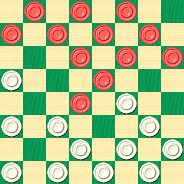
WHITE
White to Play and Win
W:W32,31,30,29,28,27,26,24,22,21,19,13:B18,15,12,11,10,8,7,6,5,3,2,1.
Demonstrating the win takes some time and effort. J.R. can do it; can you? It's not so easy, but one thing's for sure: clicking on Read More will show you how it's done.![]()
11th Anniversary
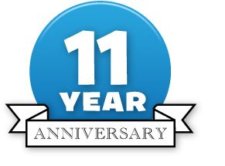
This week marks the eleventh anniversary of non-stop, no-fail weekly publication of The Checker Maven. Many thanks to all our loyal readers. We hope you'll find enough here of interest that you'll want to stay with us in the weeks and years to come.![]()
The Checker Maven is produced at editorial offices in Honolulu, Hawai`i, as a completely non-commercial public service from which no income is obtained or sought. Original material is Copyright © 2004-2026 Avi Gobbler Publishing. Other material is public domain, AI generated, as attributed, or licensed under CC1, CC2, CC3 or CC4. Information presented on this site is offered as-is, at no cost, and bears no express or implied warranty as to accuracy or usability. You agree that you use such information entirely at your own risk. No liabilities of any kind under any legal theory whatsoever are accepted. The Checker Maven is dedicated to the memory of Mr. Bob Newell, Sr.

